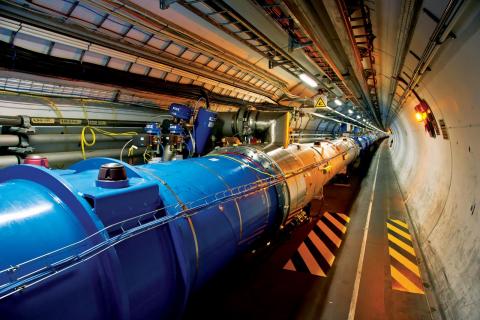

From the low energy electrons in CRT monitors to the tremendous near- light speed protons of the Large Hadron Collider, particle accelerators are everywhere. In fact, accelerators are more commonplace than you might expect, with applications ranging from manufacturing to energy production to agriculture. An ambitiously-titled article from Nautilus, “10 Reasons Why You Can’t Live Without a Particle Accelerator,” reflects on the many uses of particle accelerators.
Apart from their obvious research value uncovering the fundamental properties of matter, accelerators have a huge range of practical applications. Of these, some of the most unexpected applications come from manufacturing. Surprisingly, one of the first industrial applications of accelerators was sealing containers such as potato chip bags and milk cartons. Rather than waiting for glue to dry on a container, an electron accelerator can immediately polymerize it with beta radiation, making the glue set instantly.
A more renowned manufacturing application of accelerators gained fame in Silicon Valley—chip doping. Doping refers to the process by which impurities are deliberately added to a semiconductor to change its conductive properties. Multiple doping techniques are used to build the ubiquitous chips in our electronics, but of them “ion implantation” most directly utilizes accelerators. In this process, an accelerator is used to collide a particular ion with a solid target, embedding it at a precise depth. This is used to change semiconductor properties and is one of the most important industrial processes in the world of electronics.
TRIUMF is proof that accelerators can also directly help save lives. Some accelerators, including the TRIUMF 500 MeV cyclotron, can produce high-energy proton beams to treat cancer. In a technique called proton therapy, a beam of protons is fired into the body to destroy tumor cells with minimal damage to the surrounding tissue. TRIUMF is the only facility in Canada capable of performing this treatment, and has treated over 200 patients suffering from a rare form of eye cancer.
Perhaps the mostly rapidly expanding use for accelerators for health is the production of medical isotopes. Certain isotopes are critical for various medical procedures, such as PET (Positron Emission Tomography) scans. Ground-breaking research in Canada has pioneered new techniques for producing these isotopes using accelerators, with TRIUMF leading the charge.
Accelerators are also finding more and more uses in the energy sector. These include the potential to increase [RK1] the safety of nuclear reactors by maintaining subcritical reactions, as well as searching for oil deposits using neutron emitters. Of all the applications directed at the energy sector, TRIUMF has been most involved with cleaning up coal plant emissions.
Accelerator technology from BC is aiming to reduce the environmental impact of coal power plants. Burning coal releases noxious nitrogen and sulphur oxides that can form acid rain. However, these compounds can be oxidized into harmless—and in fact useful—compounds by irradiating them with electrons while exposing them to ammonia. PAVAC Industries Inc., a Richmond B.C.-based company that helped construct superconducting cavities for ARIEL, is designing this technology. Electron beam flue gas treatment (EBFGT) may be capable of turning unwanted emissions from coal plants into commercial grade fertilizers.
With such surprising and far-reaching impacts, particle accelerators are becoming more and more integrated into our daily lives. As accelerator technology continues to advance, more exciting possibilities are bound to become reality. What will we do with accelerators next?
-Nick Leach, Outreach Assistant
Top photo: The LHC, perhaps the best known particle accelerator, is used for research; however, accelerators have many applications outside of research. Courtesy of CERN.
Bottom photo: Milk cartons and juice boxes are ceiled using electron accelerators. Credit Sandbox Studio, Chicago.
Nautilus is an award-winning blog focused on the intersection of science and daily life. The article on particle accelerators appeared as part of their June 2014 theme, “Mutation.”
